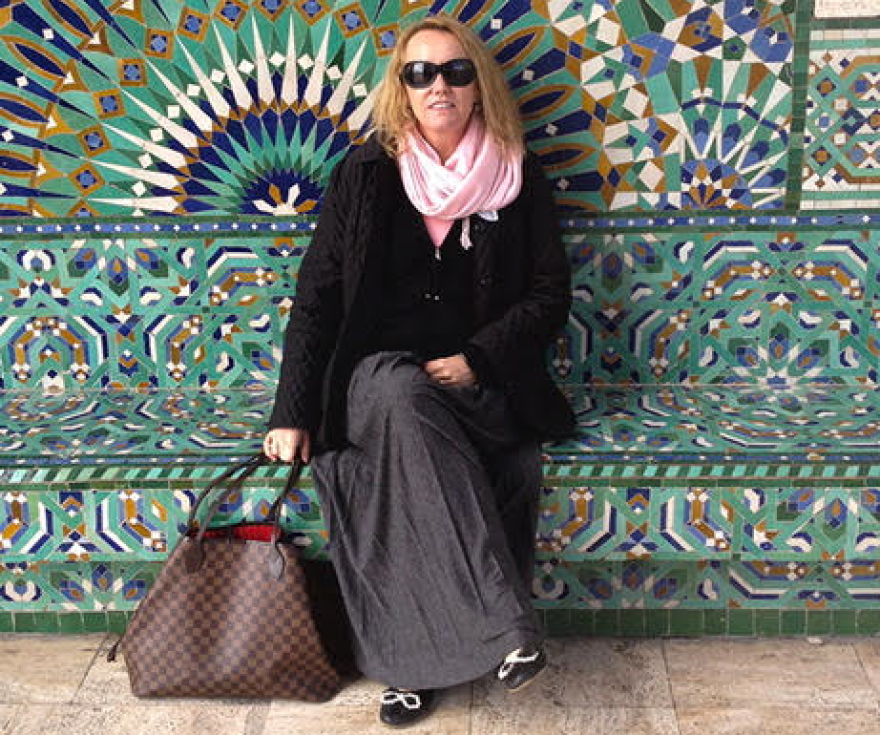Bonnie Bolling remembers when she first stepped on Middle Eastern soil. A writer, Bolling was in an airport in Dubai and the call to prayer came over the loudspeakers.
She’d never heard the call, and while she definitely felt reverence, she also panicked because she didn’t know what to expect or what her own response should be. Her heart beat hard as she stopped and awaited the reactions of her fellow travelers.
“I realized I was going to experience it in a way I was going to need to write about,” Bolling says of the Middle East.
Though she’s published two collections, Bolling doesn’t consider herself exclusively a poet; she is also the editor-in-chief of Verdad, a literary journal out of Long Beach, California.
Her newest collection, The Red Hijab, was published late last year by the University of Missouri-Kansas City’s BkMk Press. Two years ago, it won BkMk’s John Ciardi Prize for poetry, besting hundreds of entries from poets at all stages of their careers. That year’s judge was former Kansas City Art Institute teacher H.L. Hix, who has published 12 collections of poetry and now teaches philosophy and creative writing at the University of Wyoming.

Bolling’s collection will not bring about world peace, Hix writes in The Red Hijab’s forward, but it does offer “one of poetry’s most generous gifts: it sees more, and more clearly, than the nightly news sees, and it offers that richer, clearer sight to its readers.”
Related: Listen to Bonnie Bolling read and discuss her poetry on a recent episode of New Letters on the Air.
Bolling has lived in the region periodically since 2010 because her husband works in various Middle Eastern nations; currently they’re in Qatar. She spends only about two months out of each year at home in California.
She began writing the free-verse, mostly page-length pieces in The Red Hijab on Valentine’s Day, 2011. Unrest in Tunisia, which eventually became the Arab Spring, had just spilled over into Bahrain, where she was living. One day all had been well in her city, the next was chaos. She and other Westerners were put on lock-down.
“Almost immediately there were riots and Molotov cocktails, protests, people getting killed,” she says.
She rendered the scene in poems such as “Sometimes, You Shut out the Fire”:
Someone’s throwing bottles
filled with gasoline,
plugged with silk torn
from his umm’s hijab.
Fires everywhere. Tear gas.
Guards with shields and guns
six-deep in formation,
the sheer nothingness of the ground,
and those workers from India
are hanging themselves.
Though upheaval and unrest initially lit her creative fire, the experience of violence has not been the defining factor of her time in the Middle East.
In fact, she says, she’s largely been enamored of the culture. Some villages near where she lived in Bahrain were thousands of years old — unchanged with the exception of air conditioning — and the people appear to be doing what they’ve been doing for centuries: growing date trees, fishing, and making pottery. She says she’s almost envious of the simplicity.
So, beauty and humanity are seldom difficult for her to find. As she writes in “Stars, Moon, Rooster”:
Later, the road looked bright
from the kitchen window,
so she walked it.
Stars, moon. The sand.
The rooster still awake.
Then the village—
some small houses
with dark squares of glass,
the kind of house with linoleum,
with a woman who stays up late and hopes.
This is not to suggest that she can always embrace the region she calls her adopted homeland, or even make sense of it. When describing her writing about the region, she cites poet John Keats’ phrase “negative capability” – what Keats described as a great writer’s ability to be “in uncertainties, mysteries, doubts, without any irritable reaching after fact and reason.”
Bolling says she very much wanted to report on what was going on around her, so she tried to take it all in as objectively as possible. She knew she could not leave out acts and scenes that baffled her. As she writes in “All Day, a Certain, Terrible Beauty”:
I park the car. The kitchen door
is unlocked—
they will burn your flag
but they won’t steal.
It could cost them a hand.
In the large country 20 kilometers to the west,
they sever hands and heads, and put out eyes,
they cast their stones on Thursday
so they can enjoy Holy Day.
Tomorrow is Christmas Eve.
For a long time, especially during her first years in the Middle East, people back home had little to say that was good or encouraging about her going to that part of the world. She says they made general statements about something they didn’t understand or have accurate information about — and she understands that as humans we all tend to live in the bubble of our own experiences, rarely venturing out.
But venturing out allowed her to create art, and art is a safe way for people to experience the unfamiliar.
Now that she has a collection of poetry, she says, she wants to tell those who are afraid of or apprehensive about the Middle East: “Here read this, I think it will help. I hope it will.”
Bonnie Bolling reads with Katie Manning, Jason Ryberg and Jermaine Thompson at 7 p.m. on Friday, November 17, at The Writers Place, 3607 Pennsylvania, Kansas City, Missouri, 64111; 816-753-1090.
Follow KCUR contributor Anne Kniggendorf on Twitter, @annekniggendorf.


